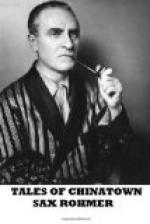Andrews was the name by which he was known to the circles in which he moved. No one, from Sir John Tennier, the fashionable portrait painter, to Kruski, of the Russian ballet, disputed Andrews’s right to be counted one of the elect. Yet it was known, nor did he trouble to hide the fact, that Andrews was employed at a large printing works in South London, designing advertisements. He was a great, red-bearded, unkempt Scotsman, and only once can I remember to have seen him strictly sober; but to hear him talk about painters and painting in his thick Caledonian accent was to look into the soul of an artist.
He was as sour as an unripe grape-fruit, cynical, embittered, a man savagely disappointed with life and the world; and tragedy was written all over him. If anyone knew the secret of his wasted life it was Dr. Kreener, and Dr. Kreener was a reliquary of so many secrets that this one was safe as if the grave had swallowed it.
One Sunday Tcheriapin joined the party. That he would gravitate there sooner or later was inevitable, for the laboratory in the garden was a Kaaba to which all such spirits made at least one pilgrimage. He had just set musical London on fire with his barbaric playing, and already those stories to which I have referred were creeping into circulation.
Although Dr. Kreener never expected anything of his guests beyond an interchange of ideas, it was a fact that the laboratory contained an almost unique collection of pencil and charcoal studies by famous artists, done upon the spot; of statuettes in wax, putty, soap and other extemporized materials, by the newest sculptors. While often enough from the drawing room which opened upon the other end of the garden had issued the strains of masterly piano-playing, and it was no uncommon thing for little groups to gather in the neighbouring road to listen, gratis, to the voice of some great vocalist.
From the first moment of their meeting an intense antagonism sprang up between Tcheriapin and Andrews. Neither troubled very much to veil it. In Tcheriapin it found expression in covert sneers and sidelong glances, while the big, lion-maned Scotsman snorted open contempt of the Eurasian violinist. However, what I was about to say was that Tcheriapin on the occasion of his first visit brought his violin.
It was there, amid these incongruous surroundings, that I first had my spirit tortured by the strains of “The Black Mass.”
There were five of us present, including Tcheriapin, and not one of the four listeners was unaffected by the music. But the influence which it exercised upon Andrews was so extraordinary as almost to reach the phenomenal. He literally writhed in his chair, and finally interrupted the performance by staggering rather than walking out of the laboratory.
I remember that he upset a jar of acid in his stumbling exit. It flowed across the floor almost to the feet of Tcheriapin, and the way in which the little black-haired man skipped, squealing, out of the path of the corroding fluid was curiously like that of a startled rabbit. Order was restored in due course, but we could not induce Tcheriapin to play again, nor did Andrews return until the violinist had taken his departure. We found him in the dining room, a nearly empty whisky-bottle beside him.




